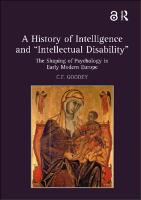A History of Intelligence and 'Intellectual Disability'
Proposal review
The Shaping of Psychology in Early Modern Europe
Abstract
Starting with the hypothesis that not only human intelligence but also its antithesis 'intellectual disability' are nothing more than historical contingencies, C.F. Goodey's paradigm-shifting study traces the rich interplay between labelled human types and the radically changing characteristics attributed to them. From the twelfth-century beginnings of European social administration to the onset of formal human science disciplines in the modern era, A History of Intelligence and 'Intellectual Disability' reconstructs the socio-political and religious contexts of intellectual ability and disability, and demonstrates how these concepts became part of psychology, medicine and biology. Goodey examines a wide array of classical, late medieval and Renaissance texts, from popular guides on conduct and behavior to medical treatises and from religious and philosophical works to poetry and drama. Focusing especially on the period between the Protestant Reformation and 1700, Goodey challenges the accepted wisdom that would have us believe that 'intelligence' and 'disability' describe natural, trans-historical realities. Instead, Goodey argues for a model that views intellectual disability and indeed the intellectually disabled person as recent cultural creations. His book is destined to become a standard resource for scholars interested in the history of psychology and medicine, the social origins of human self-representation, and current ethical debates about the genetics of intelligence.
Keywords
animal; civic; faculty; graces; honour; natural; psychology; rational; society; soulDOI
10.4324/9781315564838ISBN
9781317187844, 9781315564838, 9781409420217, 9781317187844Publisher
Taylor & FrancisPublisher website
https://taylorandfrancis.com/Publication date and place
2011Imprint
RoutledgeClassification
History of medicine


 Download
Download